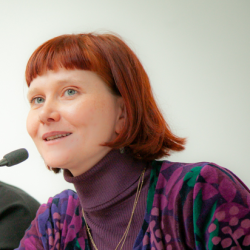Rebekka Mirjam Hölzle, PhD candidate, Birkbeck College (United Kingdom)
Project title: Migrant Women with NRPF: Resisting the UK’s Hostile Environment
Rebekka’s project, in partnership with the South London Refugee Association (SLRA), studies the immigration policy, No Recourse to Public Funds (NRPF). NRPF denies people access to statutory support based on their immigration status and disproportionately affects Black, female, single-carers. Through her project, Rebekka, hopes to address the following research questions: How does NRPF impact the lives of migrant women? How do migrant women with NRPF negotiate and resist the hostile environment? What role, if at all, practices of knowledge-sharing play as a form of resistance and solidarity between migrant women with NRPF?
Rebekka’s methodological approach is grounded in a feminist and decolonial epistemology that privileges lived experience and dialogue. Rebekka will conduct individual interviews, as well as a series of interactive and creative interventions which are made possible through the community partnership with SLRA. This will help ensure that the research is inclusive, participatory and accountable to the communities involved. In doing so, the project will highlight the invisibilised injustice of NRPF, and be impactful beyond academia by improving opportunities for migrant women’s socio-political participation.
The SLRA is a legal advice and social support centre for migrants. As the Community Engagement Coordinator (since 2019), Rebekka has initiated several action-oriented programmes facilitating socio-political participation of its visitors, including a peer-support group for women with NRPF to share their experiences and lead on actions for change. The group has been successful in changing council procedures and received support from the local MP, highlighting the effectiveness of migrant-led change. This initiative has also demonstrated women’s enthusiasm for critically reflecting on their lived realities and sharing knowledge with others. SLRA is keen to understand the impacts of NRPF, and how spaces for socio-political participation can be improved and expanded. However, as a third-sector organisation, more in-depth research of this kind is not possible due to funding and capacity restraints. Rebekka’s PhD research is an important opportunity for SLRA to facilitate more invested and intentional research spaces for women’s critical reflection, learning and activism in ways that will develop their work.
SLRA will provide a space and community for the research to be embedded in. This will facilitate an ethically grounded and politically engaged recruitment of research participants. The participants will be women service users of SLRA that have already participated in diverse community projects. The partnership will ensure that the women are engaged in all the different research phases. Participants will help refine the research methodologies, questions, and engage in the data collection in participatory and creative ways. Women can choose to participate in individual interviews or only group workshops. The interviews will explore the intersection of gender-migration-activism in participants’ lives. The workshops will collectively and creatively explore the themes that emerged in the interviews and from my work with SLRA. Rebekka will employ a range of creative methods that include textile and embroidery, paper and art material, movement and play, singing and music, poetry and creative writing. Participants are encouraged and supported to facilitate and lead the sessions where appropriate. All sessions will include lunch, transport and child care, with assistance of SLRA volunteers.
The suggested workshops series and residency are designed in an action-oriented way. The materials produced from the different creative methodologies will be collated in a format appropriate to the workshop outcomes, and interests of the participants. This will be published or exhibited in partnerships with alternative cultural spaces, galleries, libraries, and museums. The team will also produce a ‘Handbook for Radical Migrant Solidarity’ (working title) based on the themes discussed during the workshops and residency. In particular, it will offer insights about the creation of solidarity spaces for migrant women based on their lived experience. This will be a valuable resource for other organisations and community groups to use and share to build community-capacity of their own. The research participants will be supported to take active roles in the production of these outputs. This will offer important opportunities for participants to develop writing, media and presentation skills.
